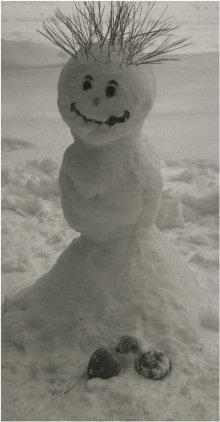8 November 2005
Winter Ain't What it Used To Be
by Kate Melville
 New England residents may dread the severe winters that the region often suffers, but they might be surprised to learn that those winters appear to be getting milder and shorter. At least, that's according to research in the journal Climatic Change, which suggests that the total number of days of ice on the region's rivers during winter has declined significantly in recent decades.
New England residents may dread the severe winters that the region often suffers, but they might be surprised to learn that those winters appear to be getting milder and shorter. At least, that's according to research in the journal Climatic Change, which suggests that the total number of days of ice on the region's rivers during winter has declined significantly in recent decades.
The researchers, from the U.S. Geological Survey (USGS), examined data from stream-flow-gauging stations in Maine, New Hampshire, and Vermont and looked at the number of days each year of ice-affected flow. They found that the days of ice-affected flow decreased significantly during the 20th century at 75 percent of the rivers they studied. The total winter days of ice-affected flow decreased by 20 days from 1936 to 2000, with most of the decrease occurring since the 1960s.
It seems that most of the change is happening at the melting end of the cycle. Only four of the 16 rivers had significantly later first dates of ice-in, but twelve of the 16 rivers had significantly earlier spring ice-out. The ice-out dates became earlier by an average of 11 days from 1936 to 2000, again with most of the change occurring since the 1960s.
"The overall evidence of changes is strong and is consistent with warming temperatures in the late-winter and spring in New England in the last 30 to 40 years," said USGS hydrologist Glenn Hodgkins. But Hodgkins refused to be drawn on whether the changes were due to a general warming trend. "Questions of the broader impact, the cause of this trend, and whether the warmer climate in New England is linked to global climate change are beyond the scope of these studies."
But while the USGS might be reluctant to speculate on whether global warming may be responsible, other studies seem to confirm a general warming trend. Previous USGS studies have shown:
- Yearly snow in northern New England decreased significantly in favor of rain during the last half of the 20th century.
- Winter/spring high river flows, which are influenced by snowmelt, came significantly earlier during the 20th century in northern New England with most of the 1-to-2-week change occurring over the last 30 years.
- Lakes showed ice-out dates came about 5 days earlier from 1968 to 2000 in northern and mountainous areas of Maine and New Hampshire and approximately 13 days earlier in more southerly areas of these states.
And earlier last-frost dates and lilac-bloom dates also indicate that New England's ferocious winters are losing some of their bite.
Source: United States Geological Survey
